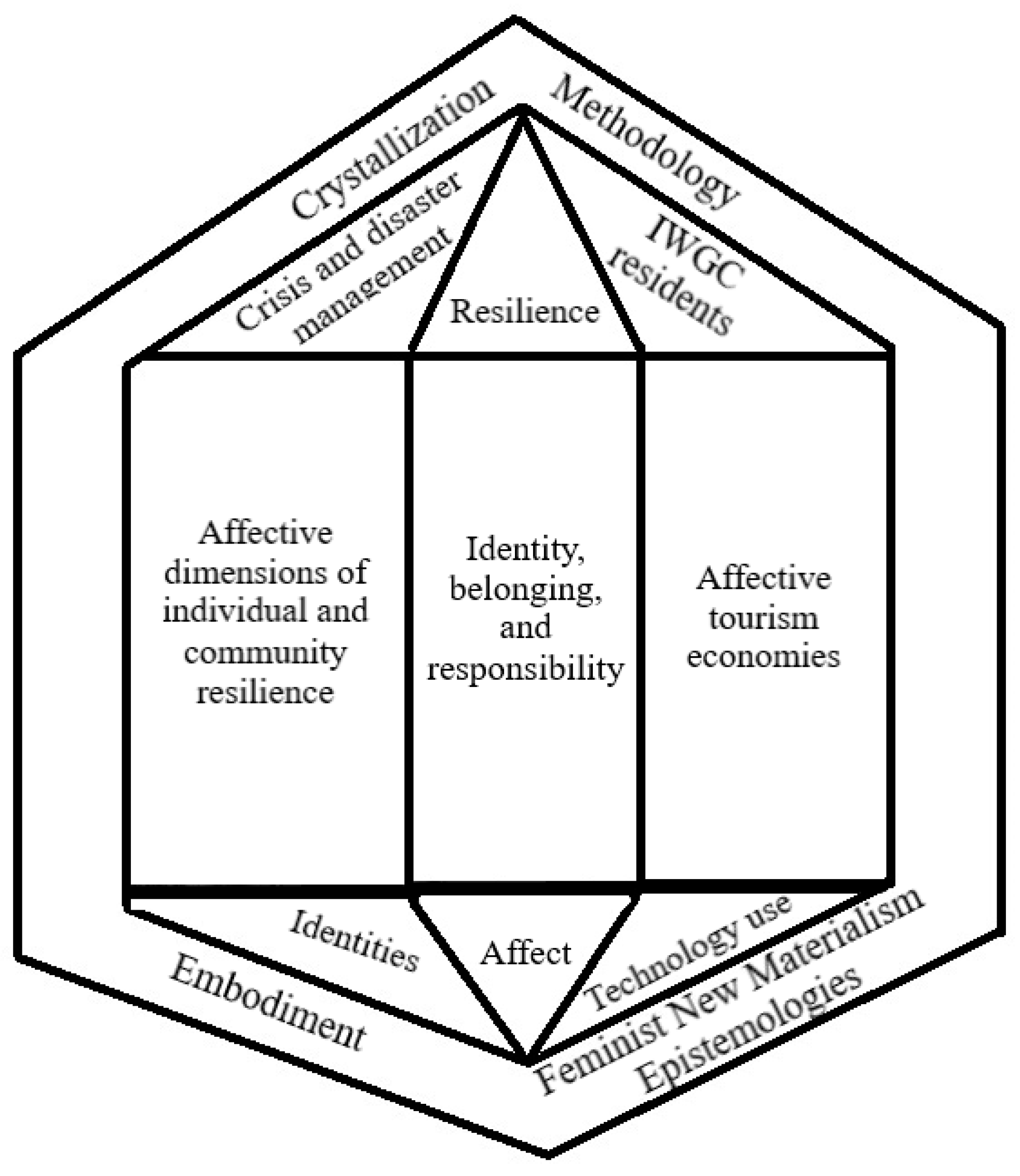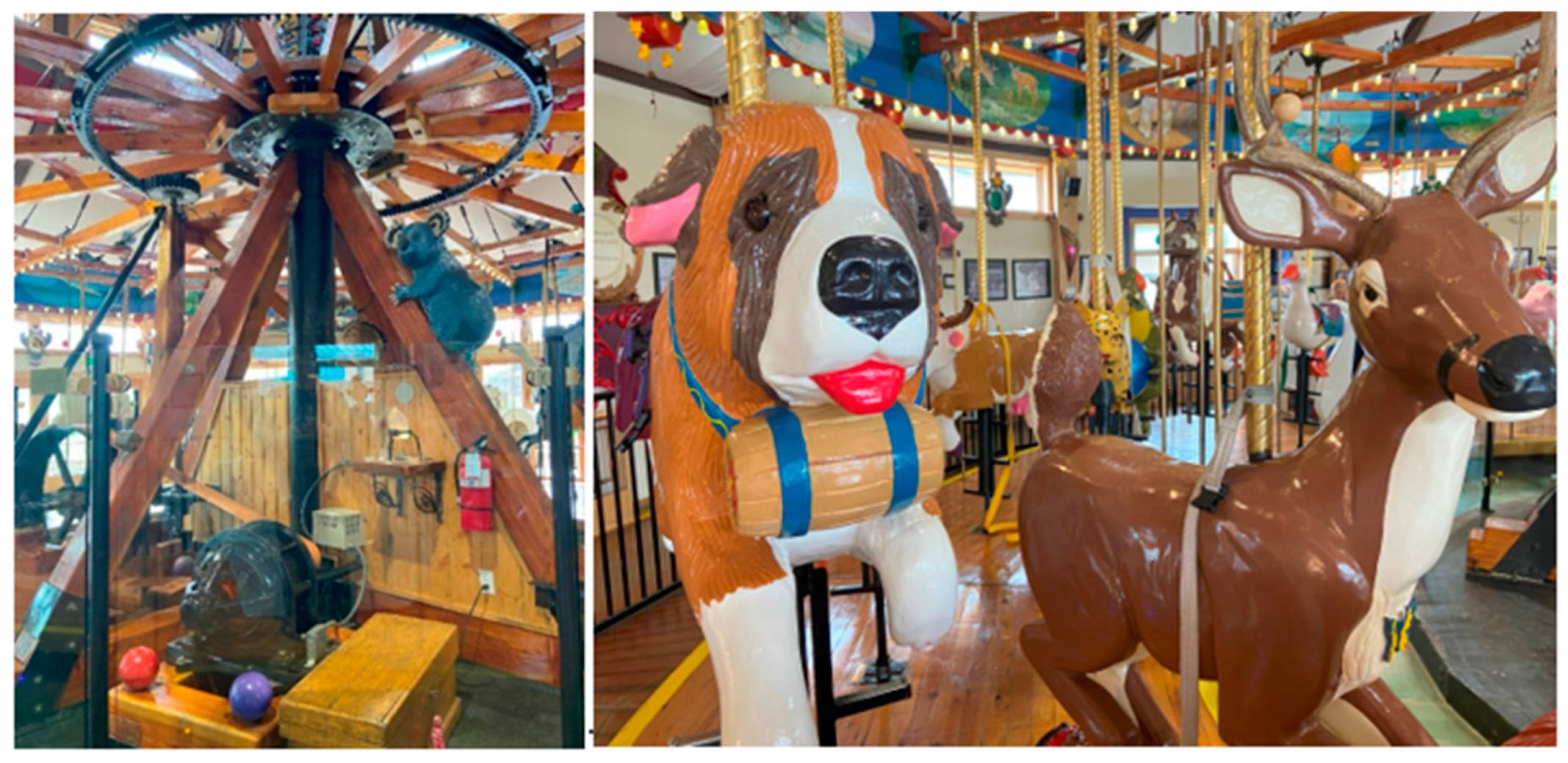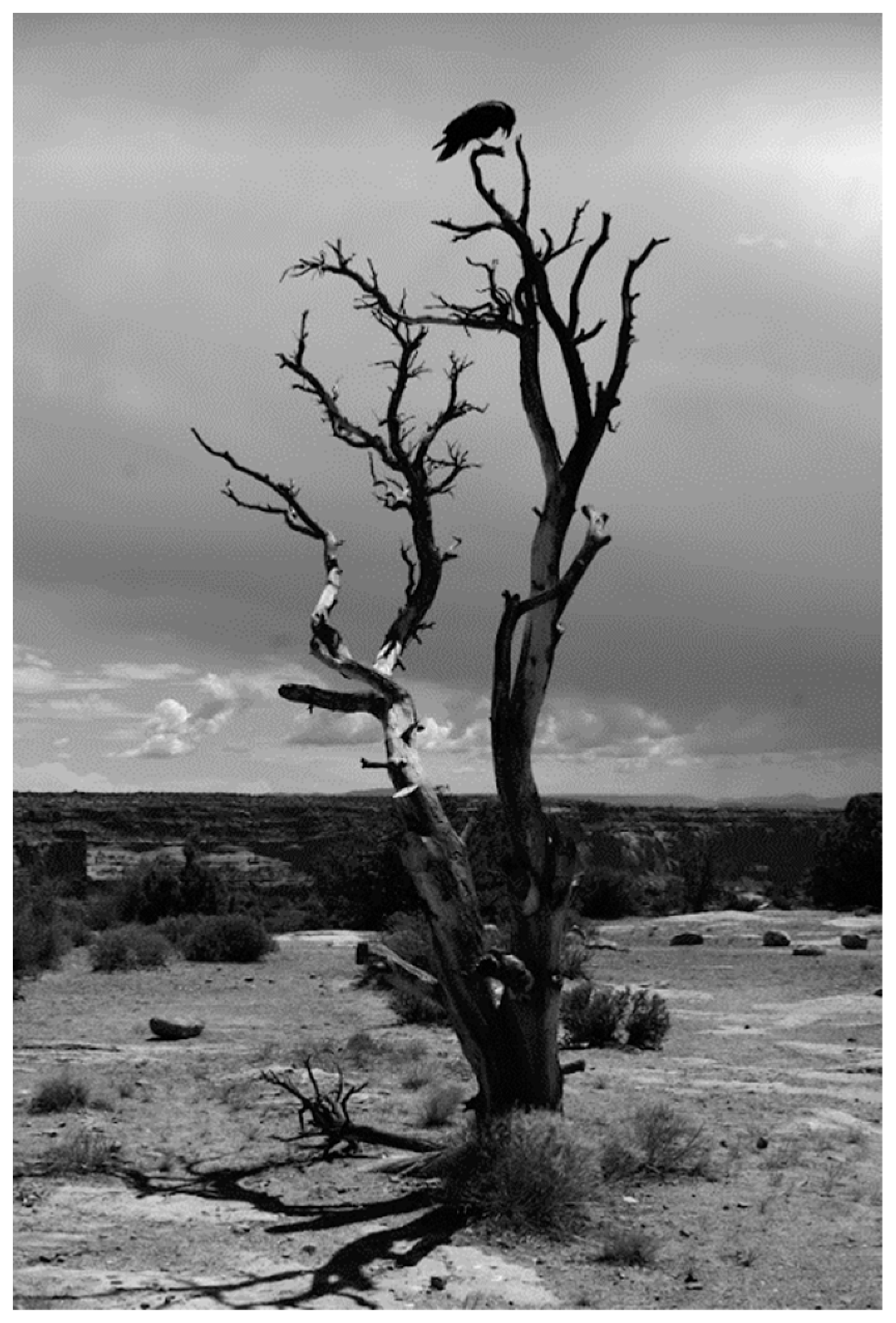Affective Dimensions of Compound Crises in Tourism Economies: The Intermountain Western Gateway Community of Nederland, Colorado
Abstract
1. Introduction
Research Location and Context
2. Materials and Methods
2.1. Epistemological Foundation
2.2. Methods of a Crystallization Methodology
3. Results
3.1. Affective Dimensions of Resilience
I guess, freedom, right? Like, I mean, riding your bike feels free and you feel like a kid. That’s kind of the feeling that I’m always chasing…it’s like a form of meditation…as long as I keep telling myself that I can keep going, I can keep going…I think that’s been a great outlet really helped me through the past couple of years of the pandemic.
Definitely happiness… I have to bring up the Carousel of Happiness…It is transportational, getting on that carousel…You sit on this horse or whatever animal it is that was carved back in like World War Two era. The music comes up as the carousel starts to crank...The music starts and as it goes faster, more pieces of music come in… [you] can’t help but feel the joy and feel the love that went into all of the hand-painted animals and all of that as you’re sitting there…It is one of the happiest places on earth.
…we talked on social media…probably more than we ever did, because we felt so isolated otherwise…we shared our feelings you know, we shared our fears and shared our longings for, you know, missing that sense of community even in a small community like this…we shared a lot of our common experience during the pandemic through social media.
3.2. Identity, Belonging, and Responsibility
The identity part is important. That makes me think of the rate of return that is held by many Indigenous or people who identify as Indigenous communities around the world, the right to return to their ancestral lands… maybe someone from the southern Arapaho tribe who now lives in Oklahoma who comes to Boulder to visit, like are they a tourist? How does this definition actually work in practice?
…there was this overwhelming sense of loss of self because I became so busy after COVID …I don’t even know who I am anymore… I used to be a writer, and that was the first time that I put pen on the paper since 2020 …One of the things that I wrote was, ‘Is this seriously the only 10 minutes that I’ve had to myself in the last three years?’
…part of Nederland’s identity that makes it so particular and unique is also its greatest weakness as a town, is all this resistance to what is perceived as change when it is only improvement, right? …we can’t get a sidewalk put in in town without massive outrage. And we have an aging community and they need the sidewalk to get to the store…
…since the pandemic I took a bigger role with my family in terms of care...that’s when I started these jobs, which also was a very caring position, helping people, trying to help people, trying to guide people through what was happening…I’m not that kind of person… I have to protect my own mental health. So I try not to get too caught up in things that I can’t do.
This has always been a tourist town. There’s always been tourists and we rely on it… we can’t stop it…we need to build a community that we want to live in, with things that we want to do, and then share it with people…on the good ways to have fun, sharing it with the people who live here, realizing that people live here and are sharing our space with them—which is easier said than done.
3.3. Affective Tourism Economies
3.3.1. Communal Loss: Economies of Anger, Fear, and Anxiety
I’m still anxious a little bit about what’s going to happen…so much has changed around us...people that maybe didn’t travel before COVID realized that they can work from home, and travel.…now we can move to the mountains because we can work from home’. And I think that it’s going to affect us overall as a community a lot.
“a lot of anger there and a little frustration and disagreement with the antivaxxers or the people and the actions that people have taken…the violence, the political discourse, the disease, the pandemic, global warming. I mean, what more can we take?”
Estes Park is the gateway to Rocky Mountain National Park and it sucks, it’s a fucking bullshit tourist town where you can go buy a tomahawk made [abroad]. What the fuck is that man?
3.3.2. Queer Optimism: Economies of Gratitude, Luck, and Appreciation
I’ve changed a lot…I’ve gained more self-respect for myself, internalized my feelings about a lot of things that I’d just pushed away for so long… watching people get sick and die, and hearing about it. So much pain just made me realize what mattered was the love I have for people and the passions that we can create.
3.3.3. Economies of Empathy and Sympathy
My overall impression is that the pandemic—if it did one common thing to all of us…it reinforced concepts of ourselves. And then either it made us dig in deeper, or open ourselves up to new possibilities… I watched my partner become less empathic of people who moved here… It’s a common theme for me about how the pandemic affected a small rural gateway community—whichever way we were leaning, we leaned into it further.
3.3.4. Affective Economies of Humor
…there are local musicians in our community…who were so energized because it was about six months and five months into the pandemic, when people were really feeling down. When people saw ‘oh, wow’, you know, they can be creative, they can adapt, they’re really about the community… we did some really funny videos…we did a spoof on the shining at the library...it kept the energy up.
4. Discussion
5. Conclusions
Author Contributions
Funding
Institutional Review Board Statement
Informed Consent Statement
Data Availability Statement
Acknowledgments
Conflicts of Interest
References
- Cavaliere, C.T.; Ingram, L.J. Climate change and anger: Misogyny and the dominant growth paradigm in tourism. Ann. Leis. Res. 2021, 26, 354–371. [Google Scholar] [CrossRef]
- Ahmed, S. Collective feelings: Or, the impressions left by others. Theory Cult. Soc. 2004, 21, 25–42. [Google Scholar] [CrossRef]
- Martini, A.; Buda, D.M. Dark tourism and affect: Framing places of death and disaster. Curr. Issues Tour. 2020, 23, 679–692. [Google Scholar] [CrossRef]
- Everingham, P.; Motta, S.C. Decolonising the ‘autonomy of affect’ in volunteer tourism encounters. Tour. Geogr. 2022, 24, 223–243. [Google Scholar] [CrossRef]
- Cavaliere, C.T.; Branstrator, J.R. A critical biocultural identity framework. Soc. Nat. Resour. 2024, 37, 213–333. [Google Scholar] [CrossRef]
- Beauchamps, M. Perverse tactics: ‘Terrorism’ and national identity in France. Cult. Theory Crit. 2017, 58, 48–61. [Google Scholar] [CrossRef][Green Version]
- Faulkner, B. Towards a framework for tourism disaster management. Tour. Manag. 2001, 22, 135–147. [Google Scholar] [CrossRef]
- Niemiec, R.M.; Gruby, R.; Quartuch, M.; Cavaliere, C.T.; Teel, T.L.; Crooks, K.; Salerno, J.; Solomon, J.N.; Jones, K.W.; Gavin, M.; et al. Integrating social science into conservation planning. Biol. Conserv. 2021, 262, 109298. [Google Scholar] [CrossRef]
- Stoker, P.; Rumore, D.; Romaniello, L.; Levine, Z. Planning and development challenges in western gateway communities. J. Am. Plan. Assoc. 2021, 87, 21–33. [Google Scholar] [CrossRef]
- Powell, J.; Rumore, D.; Smith, J. The GNAR Initiative: Empowering gateway communities through collaboration. In Innovative and Promising Practices in Sustainable Tourism; Vaugeois, N., Phillips, M., Arbogast, D., Twilley, D., Eds.; VIU Publications: Nanaimo, BC, Canada, 2021; Volume 3, pp. 3–16. [Google Scholar]
- Branstrator, J.R.; Cavaliere, C.T.; Xiong, L.; Knight, D. Extended reality and sustainable tourism: Restorying human–wildlife relationships for biocultural conservation. J. Ecotourism 2023, 22, 103–119. [Google Scholar] [CrossRef]
- Cartier, E.A.; Taylor, L.L. Living in a wildfire: The relationship between crisis management and community resilience in a tourism-based destination. Tour. Manag. Perspect. 2020, 34, 100635. [Google Scholar] [CrossRef]
- Rumore, D.; Stoker, P. Rural Gentrification and the Spillover Effect: Integrated Transportation, Housing, and Land Use Challenges and Strategies in Gateway Communities. In National Institute for Transportation and Communities; Transportation Research and Education Center: Portland, OR, USA, 2023; NITC-RR-1475. [Google Scholar]
- d’Hauteserre, A.M. Affect theory and the attractivity of destinations. Ann. Tour. Res. 2015, 55, 77–89. [Google Scholar] [CrossRef]
- Hollinshead, K. The “Worldmaking” Prodigy of Tourism: The Reach and Power of Tourism in the Dynamics of Change and Transformation. Tour. Anal. 2009, 14, 139–152. [Google Scholar] [CrossRef]
- Tucker, H.; Shelton, E.J. Tourism, mood and affect: Narratives of loss and hope. Ann. Tour. Res. 2018, 70, 66–75. [Google Scholar] [CrossRef]
- Cavaliere, C.T.; Branstrator, J.R.; Cheer, J.M. Intersectional emancipation for biocultural conservation: An exploratory neolocalism framework. J. Travel Res. 2024; manuscript accepted for publication. [Google Scholar]
- Ahmed, S. Affective economies. Soc. Text 2004, 22, 117–139. [Google Scholar] [CrossRef]
- Mostafanezhad, M. Volunteer Tourism: Popular Humanitarianism in Neoliberal Times; Ashgate Publishing Company: Farnham, UK, 2014; ISBN 9781409469551. [Google Scholar]
- Holst, T. The Affective Negotiation of Slum Tourism: City Walks in Delhi; Routledge: London, UK, 2018. [Google Scholar]
- Mostafanezhad, M. COVID-19 is an unnatural disaster: Hope in revelatory moments of crisis. Tour. Geogr. 2019, 22, 639–645. [Google Scholar] [CrossRef]
- Mostafanezhad, M.; Cheer, J.M.; Sin, H.L. Geopolitical anxieties of tourism: (Im)mobilities of the COVID-19 pandemic. Dialogues Hum. Geogr. 2020, 10, 182–186. [Google Scholar] [CrossRef]
- Sodja, E. How to Shred GNAR(ly) Problems: An Innovative Webinar Series Addressing Housing Affordability Issues in Utah and Across the West. Outcomes Impact Q. 2021, 1, 1–4. [Google Scholar] [CrossRef]
- McGreevy, J.R.; Adrien, E. Second impact syndrome: The influence of climate change and increased disaster frequency on livelihoods and adaptive capacity in rural Haiti. Int. J. Disaster Risk Reduct. 2023, 85, 103509. [Google Scholar] [CrossRef]
- Buda, D.M. Affective Tourism: Dark Routes in Conflict; Routledge: New York, NY, USA, 2015; ISBN 978-1-215-74278-6. [Google Scholar]
- Ellingson, L.L. Engaging Crystallization in Qualitative Research: An Introduction; SAGE: Newcastle upon Tyne, UK, 2009; ISBN 978-1-4129-5907-0. [Google Scholar]
- Sharma, G.D.; Thomas, A.; Paul, J. Reviving tourism industry post-COVID-19: A resilience-based framework. Tour. Manag. Perspect. 2021, 37, 100786. [Google Scholar] [CrossRef]
- Ringrose, J.; Warfield, K.; Zarabadi, S. Feminist Posthumanisms, New Materialisms and Education; Routledge: London, UK, 2020; ISBN 9780367585914. [Google Scholar]
- Coleman, R.; Page, T.; Palmer, H. Feminist new materialist practice: The Mattering of methods. MAI: Feminism & Visual Culture. 2019. Available online: https://maifeminism.com/feminist-new-materialisms-the-mattering-of-methods-editors-note/ (accessed on 1 February 2024).
- Matteucci, X.; Nawijn, J.; von Zumbusch, J. A new materialist governance paradigm for tourism destinations. J. Sustain. Tour. 2021, 30, 169–184. [Google Scholar] [CrossRef]
- Fernández-Giménez, M.E.; Jennings, L.B.; Wilmer, H. Poetic Inquiry as a Research and Engagement Method in Natural Resource Science. Soc. Nat. Resour. 2019, 32, 1080–1091. [Google Scholar] [CrossRef]
- Hesse-Biber, S. Feminist approaches to in-depth interviewing. In Feminist Research Practice: A Primer; SAGE Publications, Inc.: Thousand Oaks, CA, USA, 2014; pp. 182–232. [Google Scholar]
- Cavaliere, C.T. Cultivating Climate Consciousness: Agritourism Providers’ Perspectives of Farms, Food and Place. Ph.D. Thesis, University of Otago, Dunedin, New Zealand, 2017. Available online: http://hdl.handle.net/10523/7476 (accessed on 1 February 2024).
- Emerson, R.M.; Fretz, R.I.; Shaw, L.L. Writing Ethnographic Fieldnotes, 2nd ed.; University of Chicago Press: Chicago, IL, USA, 2011; Available online: http://site.ebrary.com/id/10991085 (accessed on 1 February 2024).
- Swain, M. (Dis)embodied Experience and Power Dynamics in Tourism Research; Routledge: London, UK, 2004; pp. 102–118. [Google Scholar]
- McNiff, S. Imagination in Action: Secrets for Unleashing Creative Expression; Shambhala Publications: Boulder, CO, USA, 2015. [Google Scholar]
- Guest, G.; Namey, E.; Chen, M. A simple method to assess and report thematic saturation in qualitative research. PLoS ONE 2020, 15, e0232076. [Google Scholar] [CrossRef] [PubMed]
- Ryan, G.W.; Bernard, H.R. Techniques to Identify Themes. Field Methods 2003, 15, 85–109. [Google Scholar] [CrossRef]
- Braun, V.; Clarke, V. Reflecting on reflexive thematic analysis. Qual. Res. Sport Exerc. Health 2019, 11, 589–597. [Google Scholar] [CrossRef]
- Hall, C.M.; Prayag, G.; Amore, A. Tourism and Resilience: Individual, Organisational and Destination Perspectives; Channel View Publications: Bristol, UK, 2018; ISBN 978-1-84541-629-4. [Google Scholar]
- Magis, K. Community Resilience: An Indicator of Social Sustainability. Soc. Nat. Resour. 2010, 23, 401–416. [Google Scholar] [CrossRef]
- Cloud, D. 6 Principles for Communicating Controversial Science. Presented at the School of Global Environmental Sustainability Leadership Fellows Workshop, Fort Collins, CO, USA, 21 October 2022. [Google Scholar]
- Hanks, L.; Zhang, L.; Line, N. Perceived similarity in third places: Understanding the effect of place attachment. Int. J. Hosp. Manag. 2020, 86, 102455. [Google Scholar] [CrossRef]
- Howe, J.; McMahon, E.T.; Propst, L. Balancing Nature and Commerce in Gateway Communities; Island Press: Washington, DC, USA, 2012. [Google Scholar]
- Hu, F.; Kong, W.; Innes, J.L.; Wu, W.; Sunderland, T.; Wang, G. Residents’ Perceptions toward Tourism Development: A Case Study from Grand Canyon National Park, USA. Sustainability 2022, 14, 13128. [Google Scholar] [CrossRef]
- Dengler, C.; Strunk, B. The Monetized Economy Versus Care and the Environment: Degrowth Perspectives On Reconciling an Antagonism. Fem. Econ. 2018, 24, 160–183. [Google Scholar] [CrossRef]
- Amoamo, M.; Ruckstuhl, K.; Ruwhiu, D. Balancing Indigenous Values Through Diverse Economies: A Case Study of Māori Ecotourism. Tour. Plan. Dev. 2018, 15, 478–495. [Google Scholar] [CrossRef]
- Willett, J.; Saunders, C.; Hackney, F.; Hill, K. The affective economy and fast fashion: Materiality, embodied learning and developing a sensibility for sustainable clothing. J. Mater. Cult. 2022, 27, 219–237. [Google Scholar] [CrossRef]
- Sandlin, J.A.; Maudlin, J.G. Disney’s pedagogies of pleasure and the eternal recurrence of whiteness. J. Consum. Cult. 2017, 17, 397–412. [Google Scholar] [CrossRef]
- Shiva, V. Earth democracy: Creating living economies, living democracies, living cultures. South Asian Pop. Cult. 2004, 2, 5–18. [Google Scholar] [CrossRef]
- Erickson, B. The Neoliberal Tourist: Affect, Policy and Economy in the Canadian North. ACME 2021, 20, 58–80. [Google Scholar]
- Pugh, J. Resilience as new political reality. In Tourism and Resilience; Butler, R.W., Ed.; CABI: Wallingford, UK, 2012; pp. 206–214. [Google Scholar]
- Günaydın, Y.; Kozak, M. Managing Crisis in the Tourism Industry: How Pessimism Has Changed to Optimism? Tourism 2022, 70, 317–330. [Google Scholar] [CrossRef]
- Snediker, M.D. Queer Optimism: Lyric Personhood and Other Felicitous Persuasions; University of Minnesota Press: Minneapolis, MN, USA, 2009. [Google Scholar]
- Sedgwick, E.K. Touching Feeling: Affect, Pedagogy, Performativity; Duke University Press: Durham, NC, USA, 2003. [Google Scholar]
- Hajibaba, H.; Karlsson, L.; Dolnicar, S. Residents Open Their Homes to Tourists When Disaster Strikes. J. Travel Res. 2017, 56, 1065–1078. [Google Scholar] [CrossRef]
- LaCapra, D. Writing History, Writing Trauma; Johns Hopkins University Press: Baltimore, MD, USA, 2001; ISBN 9780801864964. [Google Scholar]
- Jeffrey, D. Empathy, sympathy and compassion in healthcare: Is there a problem? Is there a difference? Does it matter? J. R. Soc. Med. 2016, 109, 446–452. [Google Scholar] [CrossRef]
- Tucker, H. Empathy and tourism: Limits and possibilities. Ann. Tour. Res. 2016, 57, 31–43. [Google Scholar] [CrossRef]
- Pedwell, C. Affective (self-) transformations: Empathy, neoliberalism and international development. Fem. Theory 2012, 13, 163–179. [Google Scholar] [CrossRef]
- Tamborrel, L.L.Z.; Cheer, J.M. Harnessing empathy in hospitality and tourism: Are conversations the answer? Hosp. Soc. 2019, 9, 53–70. [Google Scholar] [CrossRef]
- Crossley, É. Psychosocial stories: Narrative and deep reflexivity in tourism research. In Proceedings of the Building Our Stories: Co-Creating Tourism Futures in Research, Practice and Education, Aalborg, Denmark, 20–22 August 2017. [Google Scholar]
- Li, Y.; Liu, C.; Yang, Y.; Du, Y.; Xie, C.; Xiang, S.; Duan, H.; Hu, W. The influence of resilience on social creativity: Chain mediation effects of sense of humor and positive mood. Psychol. Sch. 2022, 59, 1609–1622. [Google Scholar] [CrossRef]
- Cann, A.; Collette, C. Sense of humor, stable affect, and psychological well-being. Eur. J. Psychol. 2014, 10, 464–479. [Google Scholar] [CrossRef]
- Haraway, D.J. Staying with the Trouble: Making Kin in the Chthulucene; Duke University Press: Durham, NC, USA, 2016. [Google Scholar]
- Branstrator, J.R.; Cavaliere, C.T.; Cottrell, S.; Bruyere, B.; Snodgrass, J. Crystallizing Change in a Tourism-Based Economy during COVID-19: An Intermountain Western Gateway Case Study of Nederland, Colorado. Ph.D. Thesis, Colorado State University, Fort Collins, CO, USA, 2023. [Google Scholar]
- WEST. About I-WEST. 1 June 2023. Available online: https://iwest.org/about/ (accessed on 1 June 2023).
- UNM Resilience Institute. The Transformation Network. Available online: https://resilience.unm.edu/ (accessed on 14 May 2023).
- Colorado Office of Economic Development and International Trade (COEDIT). Colorado Recovery Assistance for Tourism. Available online: https://oedit.colorado.gov/colorado-recovery-assistance-for-tourism (accessed on 14 May 2023).



Disclaimer/Publisher’s Note: The statements, opinions and data contained in all publications are solely those of the individual author(s) and contributor(s) and not of MDPI and/or the editor(s). MDPI and/or the editor(s) disclaim responsibility for any injury to people or property resulting from any ideas, methods, instructions or products referred to in the content. |
© 2024 by the authors. Licensee MDPI, Basel, Switzerland. This article is an open access article distributed under the terms and conditions of the Creative Commons Attribution (CC BY) license (https://creativecommons.org/licenses/by/4.0/).
Share and Cite
Branstrator, J.R.; Cavaliere, C.T. Affective Dimensions of Compound Crises in Tourism Economies: The Intermountain Western Gateway Community of Nederland, Colorado. Conservation 2024, 4, 253-272. https://doi.org/10.3390/conservation4020017
Branstrator JR, Cavaliere CT. Affective Dimensions of Compound Crises in Tourism Economies: The Intermountain Western Gateway Community of Nederland, Colorado. Conservation. 2024; 4(2):253-272. https://doi.org/10.3390/conservation4020017
Chicago/Turabian StyleBranstrator, Julia R., and Christina T. Cavaliere. 2024. "Affective Dimensions of Compound Crises in Tourism Economies: The Intermountain Western Gateway Community of Nederland, Colorado" Conservation 4, no. 2: 253-272. https://doi.org/10.3390/conservation4020017
APA StyleBranstrator, J. R., & Cavaliere, C. T. (2024). Affective Dimensions of Compound Crises in Tourism Economies: The Intermountain Western Gateway Community of Nederland, Colorado. Conservation, 4(2), 253-272. https://doi.org/10.3390/conservation4020017






